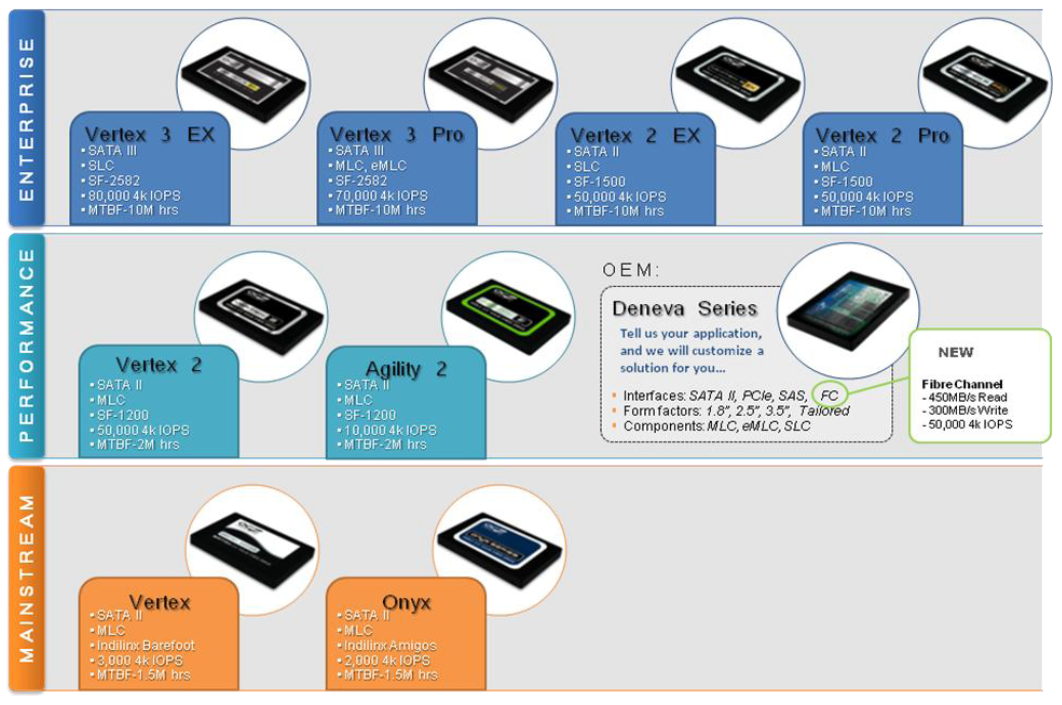OCZ's Vertex 3 Pro: Second-Gen SandForce Perf Preview
Final Words
Just as we were starting to hit the limit of what 3 Gb/s SATA can do, OCZ's Vertex 3 Pro makes SSDs exciting again (and just in time for widespread proliferation of 6 Gb/s controllers, too).
SATA 3 Gb/s treated us well for a very long time, but we are just starting to reach the point where it's not enough. Now we have 6 Gb/s connectivity on AMD’s SB850 and Intel’s P67. Up until now, we've seen this faster interface as an enabler of headroom for slower hard drives. After all, if you're buying storage controllers and paying per-port, 6 Gb/s gives you a lot more throughput. Suddenly, a four-port card can conceivably handle a 24-bay JBOD. But with products like the Vertex 3 Pro, we're moving beyond the transfer rates of a 3 Gb/s connection, meaning you need 6 Gb/s to enable the SSD's peak performance.
If you can remember that far back, OCZ announced Vertex 2 with a new controller from an unknown company in late 2009, and it took everyone by surprise. After the whole thing with JMicron, there were plenty of skeptics. Yet, SandForce decided to make its first public showing with OCZ’s Vertex 2 Pro. Back in early 2010, we could confidently say that Vertex 2 Pro was the fastest single-controller MLC-based SSD on the market. Even though we don’t have a Vertex 3 Pro running final firmware, we can again say that OCZ plans to maintain that title based on what we have seen today.
For the majority of users, the problem is going to be cost. Vertex 2 Pro’s dwindling supply still fetches close to $630 for the 100 GB model. Vertex 3 Pro changes the dynamic a bit. Not only is it bringing the next generation of performance, it is also doing it for a more attractive price. If OCZ actually manages to launch drives close to MSRP, we are one step closer to seeing performance SSDs priced around $2/GB.
Shortly after finishing this story, we got word that consumer-oriented drives aren't far behind. Stay tuned to Tom's Hardware for the first showing of SandForce's second-gen showing at price points that enthusiasts will be much more willing to pay.
Of course, the competition is hardly sitting still, so it's my hope that this is just the beginning. All of this has to make you wonder what Intel and Marvell have in the works. We are slated for more SSDs launches before Q2, which means everyone is going to be aggressive on price. If you're planning a new build and you haven’t yet pulled the trigger on a SSD, it’s time to set aside a budget.
Get Tom's Hardware's best news and in-depth reviews, straight to your inbox.
-
Bigmac80 This is why i haven't bought a SSD yet. One it's freakin expensive 2 not enough capacity 3 it's freakin expensive! It'll go down next year when the world ends in 2012.Reply -
falchard Price is lower then last generation. A shrink in die size means cheaper manufacturing costs, lower power usage, and better performance. Thats what happens when every hardware company shrinks their chips.Reply
Considering this is going to have the same amount of space, its going to be a cheaper SSD. -
aaron88_7 These are for enterprise use, that's why they are priced so high. They have features average consumers don't need. In other words, you're wasting your money if you are putting these into your home computer.Reply -
dragonsqrrl OCZ Vertex 3 Pro MSRP Pricing:Reply
100GB: $525, $5.35 per GB
200GB: $775, $3.88 per GB
400GB: $1350, $3.38 per GB
Getting cheaper, but still far outside my price range given their relative capacities. Even taking their amazing performance into account, it's still going to be a difficult sell for all but the most passionate enthusiasts, pros with heavy server workloads, or hardcore idiots. You're definitely not going to be getting your moneys worth putting one of these into your gaming rig. Enterprise type applications experience the largest benefits from these types of drives, and it's probably the only application where the performance benefits balance out the higher costs. -
JohnnyLucky The article made it perfectly clear the drive is not a drive that will be offered to consumers, gamers, and pc enthusiasts. How is OCZ going to reduce prices for consumer drives? Reduce features? Cut corners? Replace high quality components with lesser quality components? On answer is OCZ will reduc features. I'd like to know what else OCZ is going to do.Reply -
Please add a TrueCrypt benchmark to your SSD evaluations, for two reasons. First, the difficulty of truly erasing data on a flash drive makes data security more important. Second, there are drives (like Sandforce) that use compression and may behave differently when storing encrypted (high entropy) data.Reply
-
Miharu Presently Plextor M2-M2S offer 370-420MB/s read for what... (64gb)150$-(128gb)250$. Vextor 3 price is out of the loop, it's too expensive. At this price I can buy 2 Plextor and put them in RAID 0.Reply
